Key takeaways:
- Microaggressions are subtle, often unintentional comments or actions that reveal bias and can accumulate emotional burdens over time.
- Gender equality is crucial for a balanced society, fostering innovation and empowerment when diverse voices are included.
- Addressing microaggressions effectively involves open communication, sharing personal experiences, and fostering allyship to create a supportive environment.
- Building supportive networks and encouraging open dialogues are essential for combating microaggressions and promoting understanding among individuals.
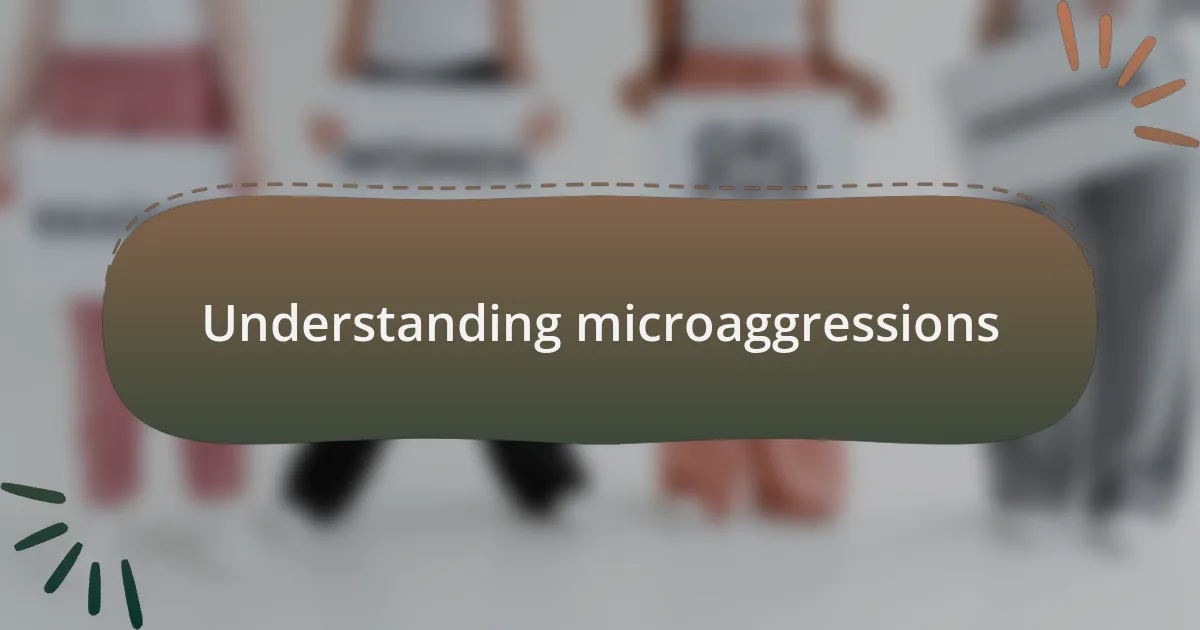
Understanding microaggressions
Microaggressions are those subtle, often unintentional comments or actions that reveal bias or prejudice. I’ve experienced situations where a seemingly harmless comment left me questioning my place in a conversation. “Are you sure you can handle this?” someone asked, which made me wonder if they saw me through a lens limited by stereotypes.
I know I’m not alone in feeling that sting. Have you ever had someone assume your role based on your gender? For me, it happened during a team project when my ideas were ignored until a male colleague echoed them. It felt like a silent message that my contributions weren’t valued solely based on who I am.
Understanding microaggressions goes beyond awareness; it’s about recognizing how they accumulate over time. When I’m confronted with them, it feels like a small weight added to my shoulders, creating an emotional burden that’s hard to shake off. How do we address these feelings and continue advocating for our voices to be heard? It’s a challenge that requires both vulnerability and resilience.
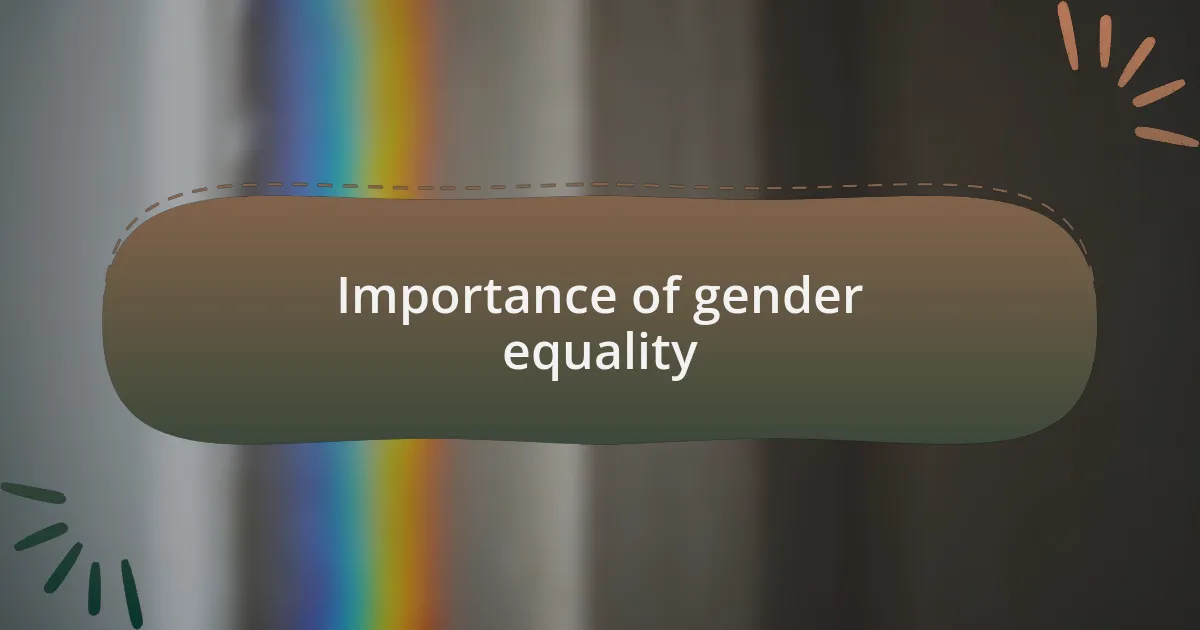
Importance of gender equality
The significance of gender equality cannot be overstated; it’s fundamental to creating a balanced society. When women and marginalized genders participate equally in all areas—be it the workplace, politics, or education—the benefits extend beyond mere representation. I recall a meeting where diverse voices sparked innovative solutions. It made me realize how vital it is to embrace different perspectives.
Moreover, gender equality fosters an environment where everyone feels empowered to express themselves. I remember attending a workshop specifically focused on gender dynamics, where participants shared their experiences. It was enlightening to see how much creativity and productivity flourished in spaces where individuals felt respected and heard. Isn’t it fascinating how inclusivity can lead to such profound change?
Ultimately, gender equality is not just a moral imperative; it’s also an economic one. Studies show that communities that support equality tend to thrive financially. I often think about how potential is lost when talent is overlooked. Have you ever wondered what innovations we might be missing out on because of gender biases? The truth is, by tearing down these barriers, we stand to gain a richer tapestry of ideas and advancements in every sphere of life.
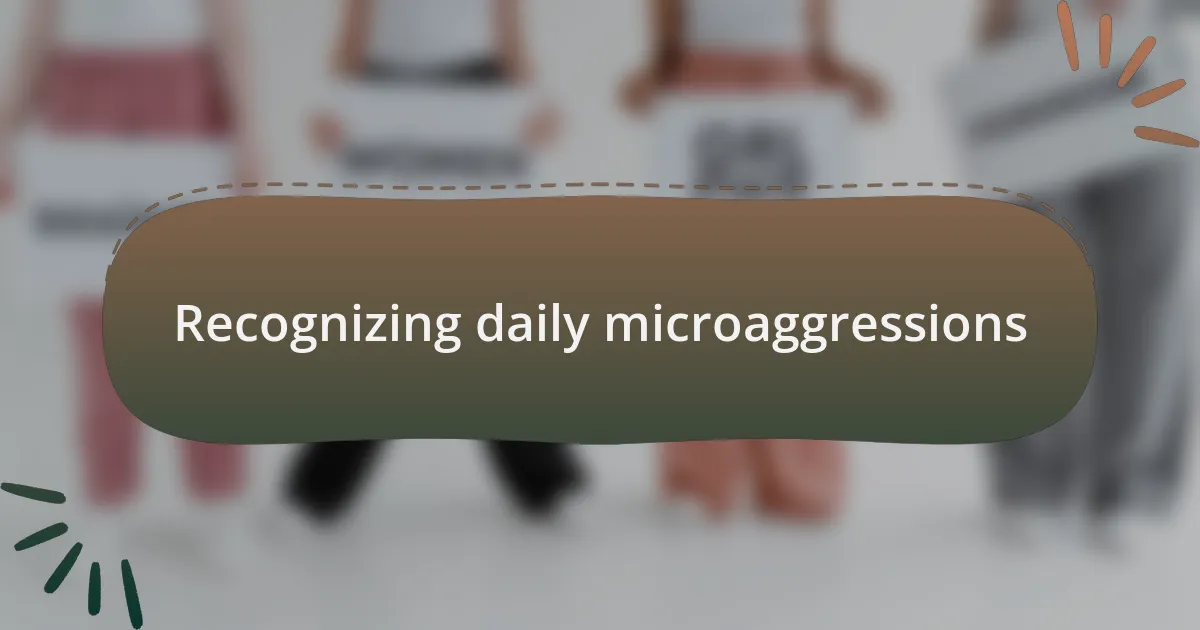
Recognizing daily microaggressions
Recognizing microaggressions in daily interactions can often feel like an uphill battle. They can be as subtle as a dismissive remark or an unintended offhand comment. For instance, I recall a colleague saying, “You’re surprisingly articulate,” insinuating that he didn’t expect me to be well-spoken because of my gender. That moment made me acutely aware of how seemingly innocent comments can carry deeper implications and stereotypes.
Sometimes, it’s the body language that speaks volumes. I once noticed a pattern where during group discussions, I was often interrupted or my ideas were overlooked. It felt disheartening and left me questioning whether my contributions were valued. Why do we sometimes accept this behavior as normal? Recognizing these situations requires us to tune into our feelings and the reactions of those around us, as they often signal underlying biases at play.
Awareness doesn’t stop at personal experiences; it extends to recognizing how microaggressions affect others. I remember sitting in a cafe, overhearing a conversation where someone casually dismissed a woman’s opinion simply because it differed from theirs. My initial reaction was anger, but it quickly turned into urgency—a need to address these moments when they occur. How many conversations go unchallenged? Learning to identify these subtle signals is the first step toward fostering a more inclusive environment.
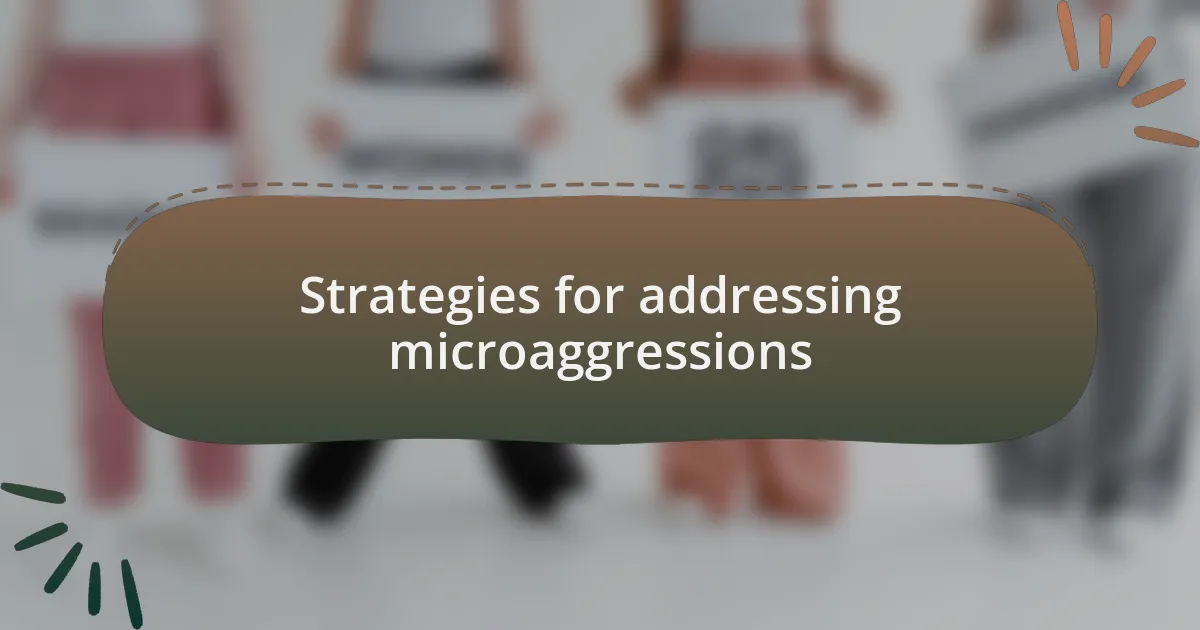
Strategies for addressing microaggressions
Addressing microaggressions effectively starts with open communication. I remember a team meeting where a colleague made a dismissive comment about another team member’s idea. Instead of letting it slide, I chose to address it directly. I gently pointed out that the comment was unwarranted and encouraged a more supportive discussion. This not only validated the team member’s contribution but also set an example for how we can cultivate a safer space for dialogue.
Another strategy I found valuable is to share personal experiences in a relatable way. After facing a microaggression during a presentation, I shared my feelings with the team afterward. I expressed how those words impacted my confidence. It’s extraordinary how much vulnerability can foster understanding. Have you ever shared your experiences and noticed the shift in atmosphere? It makes a difference when people can empathize with the emotional weight behind the words.
Lastly, I firmly believe in the power of allyship. When I witnessed a peer being unfairly treated, I made it a point to amplify their voice. By reiterating their points and recognizing their input, I was able to turn a potentially demeaning situation into one of empowerment. How often do we have the opportunity to stand up for someone else? This collective effort can slowly reshape our environments, leading to a culture where respect is prioritized and microaggressions are diminished.
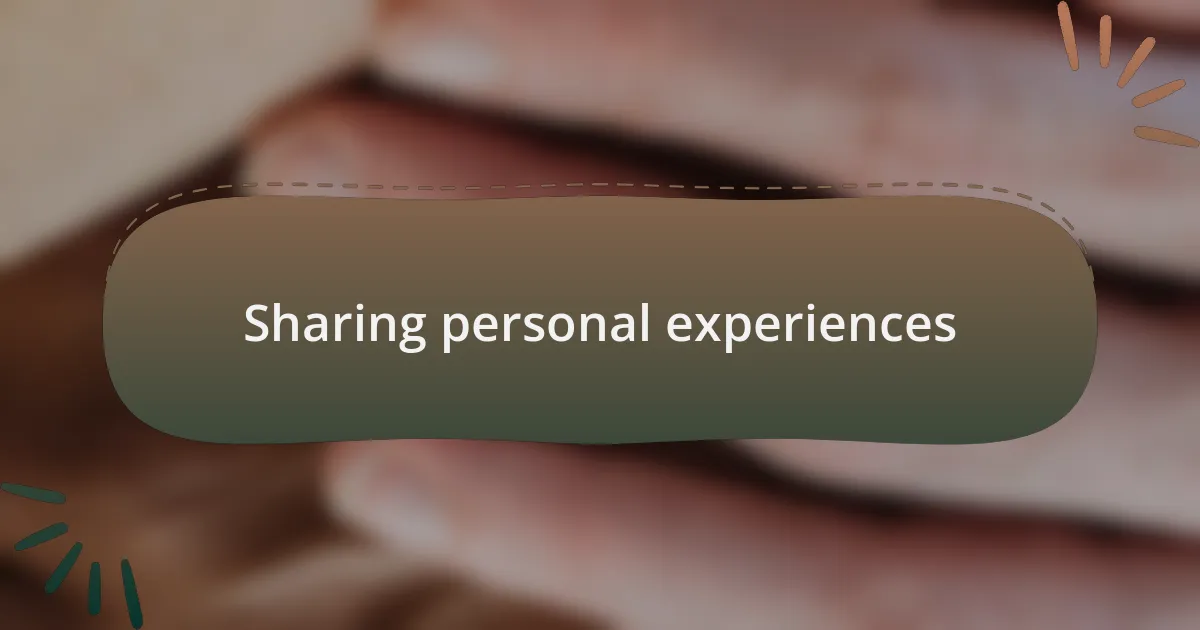
Sharing personal experiences
I once overheard a comment during a lunch break that hinted at stereotypes about women in leadership. Instead of letting that moment pass, I decided to share a story from my own career journey. I recalled a time when I was underestimated in a crucial meeting, which made me feel invisible. As I spoke, I could see the surprise and reflection on my colleagues’ faces; it struck me how sharing my vulnerability created a moment of connection.
There was another instance when I experienced a microaggression related to my appearance. The comment was seemingly innocuous, but it weighed heavily on me throughout the day. Later, I chose to confide in a trusted coworker about how the remark affected me. This conversation opened a floodgate of shared experiences, and I realized many had felt similarly dismissed. What does it feel like to be seen and heard in those moments?
I also remember a time when I facilitated a workshop on gender equality. I encouraged participants to share their experiences with microaggressions, and hearing their stories was eye-opening. One participant shared how a minor comment had lingered with her, affecting her sense of belonging in the workplace. Reflecting on our stories not only deepened our understanding but also fortified our resolve to combat such instances collectively. Have you ever thought about how powerful it can be to share your narrative?
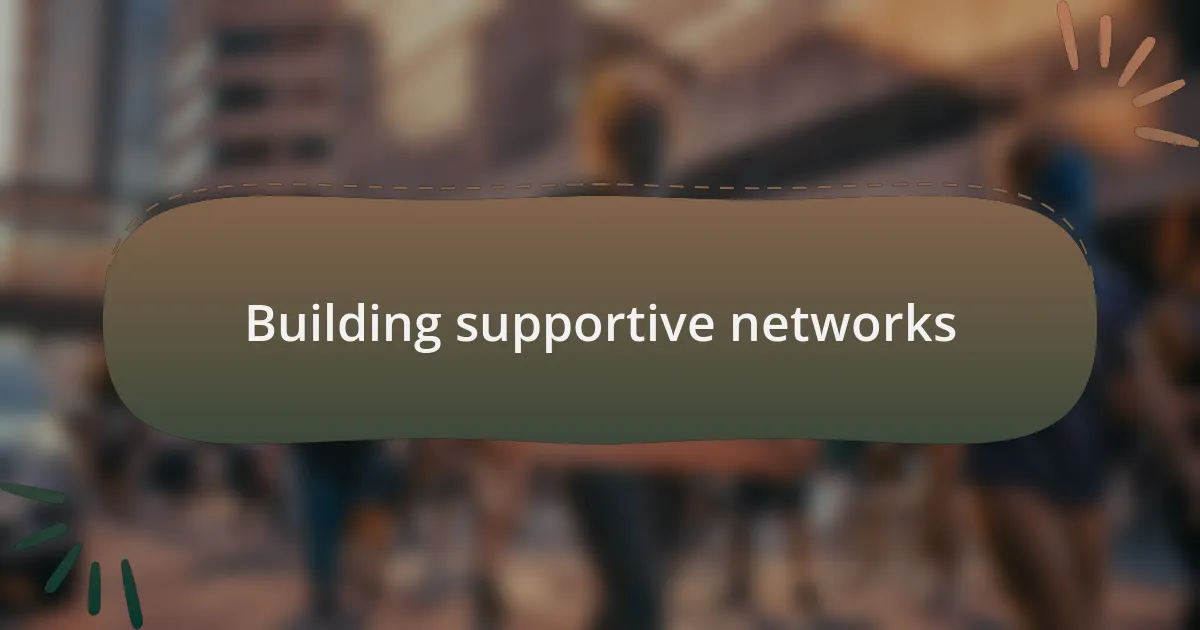
Building supportive networks
Building a supportive network is essential for addressing microaggressions. I recall a moment when I reached out to a group of women I admired, forming a small circle where we could share not just our career triumphs but also the subtle blows that often go unspoken. The first meeting was filled with laughter and tears, but what surprised me most was the immediate sense of belonging it created. Isn’t it remarkable how a few empathetic voices can diminish the weight of our struggles?
I often think about the power of alliances. After experiencing a particularly insidious microaggression at work, I confided in a mentor who had once faced similar challenges. She not only validated my feelings but also guided me on how to tackle such incidents constructively. This exchange fortified my belief in the importance of mentorship within our networks. Have you found that one person, that ally, who genuinely understands your fight?
Moreover, I encourage others to actively cultivate these networks. By attending events focused on gender equality, I’ve met individuals who, like me, have faced hurdles in their professional lives. The raw honesty shared in these spaces often ignites a spark of motivation to advocate for one another. Each story shared reminds me of our collective strength—what could we achieve if we band together to uplift each other through our challenges?
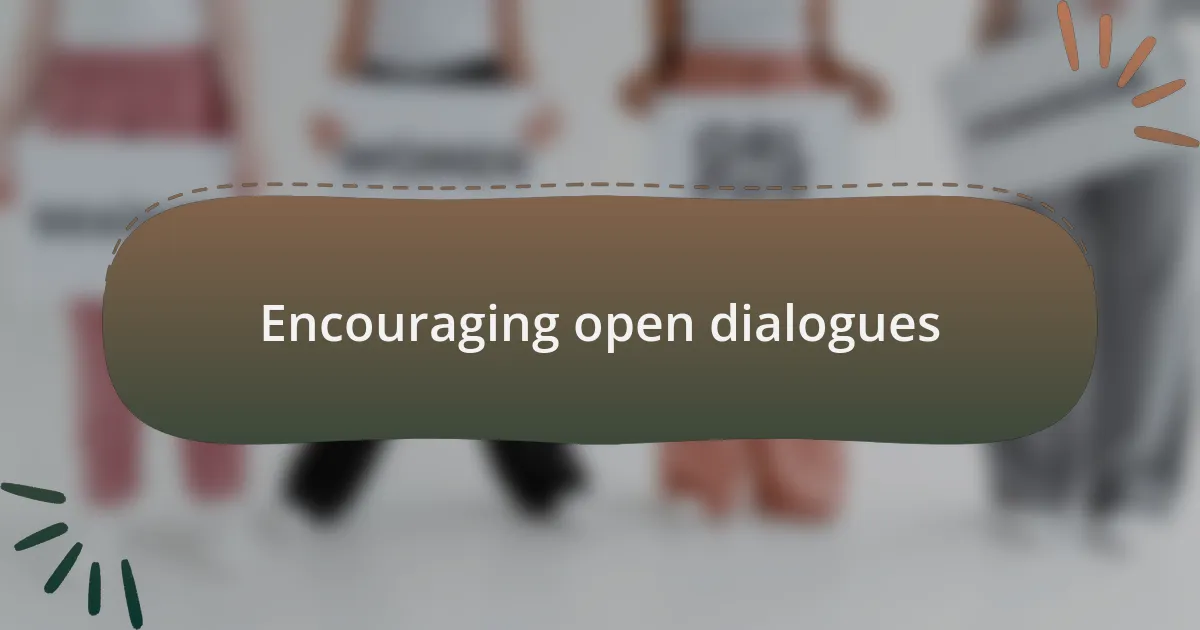
Encouraging open dialogues
Encouraging open dialogues about microaggressions is paramount in fostering understanding and change. I remember a candid conversation with a coworker after she unintentionally made a dismissive remark during a team meeting. Instead of shutting down the dialogue, I gently shared how her comment affected me. The look of realization on her face was illuminating; it reminded me that sometimes, people are unaware of the impact of their words. Have you ever taken the leap to address a moment like this?
In my experience, creating a safe environment for these discussions requires vulnerability and honesty from all parties involved. During a workshop I facilitated, I encouraged participants to share their experiences, hoping to break the ice. Initially, it felt daunting, but soon the room filled with voices sharing personal stories of microaggressions. Each shared experience sparked a wave of collective empathy, leading us to explore responses together. It’s a beautiful reminder of how empathy can bridge gaps in understanding. Have you noticed how open dialogue can shift perspectives?
When we engage in these conversations, we not only validate our own experiences but also provide space for others to reflect and grow. I once had a lengthy discussion with a friend who had never recognized the subtle biases she exhibited. By gently guiding her through examples, we concluded with actionable steps she could take to ensure her dialogue becomes more mindful. Isn’t it empowering to realize that by simply speaking up, we can help others expand their worldview? It’s this reciprocal learning that can propel us all toward a more inclusive environment.